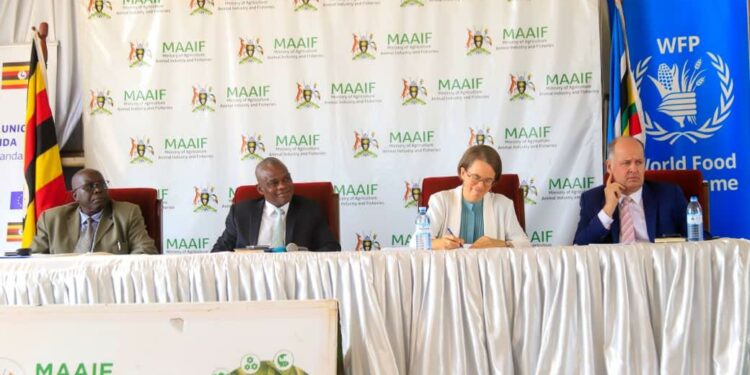In a strategic move to bolster food security and build resilience in the Karamoja sub-region, the Ministry of Agriculture, Animal Industry, and Fisheries (MAAIF), supported by a million grant from the European Union, has launched a new initiative titled “Improving Food Security and Resilience of Food Production Systems in Karamoja.”
Maj. Gen. David Kasura-Kyomukama, MAAIF’s Permanent Secretary, was represented by Under Secretary Mr Ssegawa Ronald Gyagenda at the launch welcomed the initiative and expressed that in a few years to come a famine in Karamajo will be history.
He emphasized the urgency of project implementation due to significant delays since its 2023 inception.
“I implore all stakeholders to put maximum attention and effort into this project to deliver benefits to the intended beneficiaries swiftly,” he urged. The project aims to address both immediate food security needs and longer-term resilience, especially crucial as Uganda’s recent crop production yields have been adversely affected by prolonged dry spells.
The initiative, spanning three years, has a substantial budget of €5 million—approximately UGX 20 billion. The project aims to counteract the persistent challenges faced by Karamoja’s agricultural sector, such as environmental degradation, climate change, and recurrent insecurity, which have kept food and livestock production levels low.
Implemented across all nine districts in the sub-region Abim, Amudat, Kaabong, Karenga, Kotido, Moroto, Nabilatuk, Nakapiripiriti, and Napak the project targets 16,000 households directly and an estimated 80,000 residents indirectly.
Karamoja is one of Uganda’s most climate-vulnerable regions, with recent climate-driven disruptions having drastically affected agricultural productivity. In response, the project will address these barriers by promoting sustainable farming techniques, rehabilitating degraded lands, and enhancing community capacity to adapt to changing environmental conditions.
The European Union representative from the European Commission emphasized the significance of this support in promoting sustainable agricultural practices. “The EU remains committed to addressing food security challenges by supporting initiatives that create long-term resilience,” the representative stated.
Key development partners, including the European Commission, the Food and Agriculture Organization (FAO), and the World Food Program (WFP), were also present to underscore the critical role of this project in Karamoja’s development.
FAO and WFP representatives echoed this sentiment, highlighting their commitment to sustainable food production solutions prioritising local communities’ adaptation to climate change. The project marks a significant milestone in advancing Uganda’s goals for climate-smart agriculture and addressing food security in one of its most fragile regions.
Do you have a story in your community or an opinion to share with us: Email us at editorial@watchdoguganda.com













